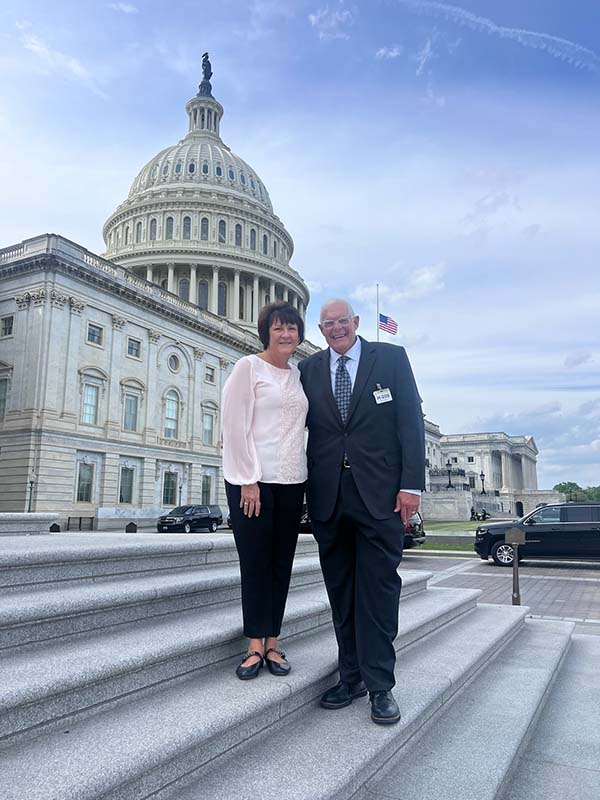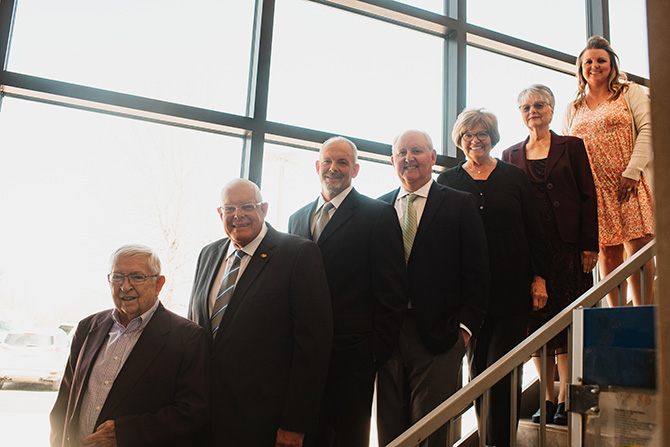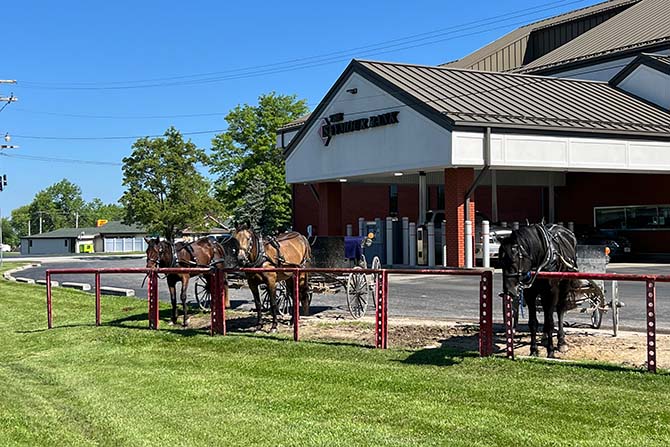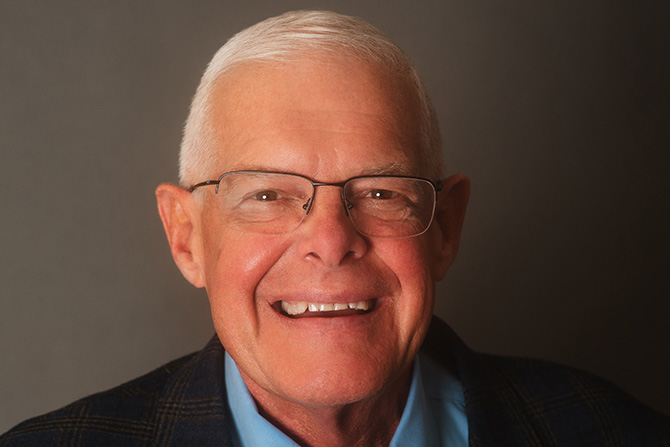At a young age, Kirk Penner learned the value of a hard day’s work from his father, Max. Max was in the grocery business. He and his partner, Wayne Gott, invested in several supermarkets in South Central and South Eastern, Missouri, and eventually expanded into northern Arkansas and Tennessee.
At the age of nine, Kirk started helping out in the local store. He worked there after school and during the summers. “I worked in every department — produce, meat, cashier — the bakery was my favorite, though; I fried lots of doughnuts,” Kirk fondly recalled. This experience taught Kirk the value of having good customer relationships.
In the early 1970s, Kirk’s father and partner made the decision to start buying some smaller banks, one of which was in Seymour, Missouri. Kirk had always thought he would be in the grocery business because that is what he knew and loved. One day, Kirk told his father he wanted to stay in the grocery business. His father responded with a kind but firm, “No. I need you to learn the banking business.” Obediently, Kirk enrolled at the University of Missouri in Columbia and started learning about banking and finances. During the summers, Kirk worked at The Seymour Bank, putting his newly learned knowledge to work.
It was during this time that he started bookkeeping. “I had to make sure everybody endorsed their checks by going through every single check by hand,” Kirk said. “We had a correspondent bank in Springfield we put our cash letter through. We would use Microfiche to check accounts and their balances.”
Kirk got along well with people, and he soon became a teller with the additional responsibility of running the proof machine to balance all of the daily bank transactions.
June of 1981 was memorable. The bank moved to a new location to accommodate its growth and, at the same time, got its first in-house computer system. “I was charged with inputting all of the customer information into the database. It took me the entire summer to complete that,” Kirk said.
Kirk graduated from business school in 1983 and started working full-time — first as a loan officer, then as an accountant, and then purchasing all of the bank’s bonds.
Over time, the bank continued to grow and there were considerably more rules and regulations that it had to comply with. “I was in charge of writing all of our policies. We did what you would think of as traditional banking, and there wasn’t anything written down — so I had to create all of the policies and procedures and put them in writing.”
Today, Kirk is the president of The Seymour Bank. The city of Seymour has not changed much over the years. It is a small town of around 2,300 people, and just outside of town, there is a large Amish community of approximately 4,000. Kirk enjoys being able to help his small community and the neighboring Amish by investing in its people.
Banking with the Amish community brings many unique experiences. There was one time an Amiah man had his horse die in the bank’s drive-through. “That was quite an event and something I never thought I would have to deal with,” said Kirk. The bank caters to the needs of its Amish customers and has installed hitches in the parking lot so they can tie their horses up when they come in and do business in the bank.
“A lot of communities have lost their community bank — the existing larger banks don’t seem to be as concerned with the local area as they are with accumulating deposits and loaning the money elsewhere. A traditional community bank isn’t doing that. The money that they loan is received from local deposits and then loaned out to local people. That money is staying here, and it’s reinvested in the community,” Kirk said.
Kirk remembers a local gentleman who wanted to go into the trash business in Seymour — picking trash up from local homes and hauling it to the dump. The gentleman approached Kirk and said he needed to borrow money to buy a 1974 Chevrolet pickup truck to haul the trash. “The truck looked like the devil; it was beat up and old,” Kirk said. “That probably wasn’t a good asset to loan on. But the philosophy I have is that you can loan on some asset, however, that’s not what’s paying you back. It’s the person you’re investing in. This is a people business.” Kirk gave him the loan.
The gentleman started out driving up and down the streets, picking up trash, putting it in his truck and going to the dump. Eventually, he needed a bigger truck and a trash packer. The Seymour Bank loaned him the money for that and continued making loans to him as dumpsters were needed. The gentleman grew a successful business, and it all started with a community bank that chose to invest in the person, not just an asset.
In the 1990s, Kirk’s mother, Carolyn, was very involved in the YMCA in a neighboring community and really wanted to have a local one. She rallied the community, and through many small donations and a number of large donors — including one from The Seymour Bank — Seymour opened its own YMCA. The facility has exercise equipment, a large indoor swimming pool, outdoor activities and much more. “I think we’re the smallest town that YMCA has done something of this magnitude in,” said Kirk. “We believe in our community, and we give back to multiple areas.”
The Seymour Bank also donated $50,000 in seed money to build a local library. A local resident was offering a donation match program, and the bank jumped at the chance to invest back into the community. The library just celebrated 25 years of enriching and educating the community.
The same can be said for the bank’s investment in a downtown project. When the Seymour Area Arts Council decided to renovate and reopen the historic Owen Theatre on the city square, it was The Seymour Bank that donated the first $20,000 to get the endeavor under way. Today, the Owen Theatre, built in 1941, is a landmark building in Seymour that plays host to more than 5,000 people.
Giving back to the community in so many ways is possible because of the strength of The Seymour Bank, and membership in MIBA helps the bank stay strong. “We have been a member for as long as I can remember. The benefits MIBA provides are invaluable. There are a lot of really good education opportunities for our employees and staff that run the gamut. In our business, you’ve got to continue education at all times because rules and regulations are constantly changing,” Kirk continued. “In my opinion, education is the top benefit followed closely by the united voice that MIBA brings to the legislature in Missouri and at to the to the federal level.”
When Kirk isn’t working, he is giving back to the community in a very special way. He is a Shriner and has played trombone in the Temple Band for the past 25 years. “We play every year in the memorial ceremony at the Springfield at the National Cemetery. We have also played for numerous Honor Flights.” Kirk explained, “Honor Flights are when veterans are escorted to Washington, D.C., free of charge, and visit the war monuments. When they come back, their friends and family gather prior to their arrival, and as they come off the plane, everybody cheers for them while the Temple Band plays their service tunes — Army, Navy, Air Force, Marines and the Coast Guard. It’s been a really good experience for me. I love doing it!”
Kirk and his wife, Terry, have been married for 33 years and have two daughters. Tammy recently retired from the City of Seymour as their business development director. While she was working there, she helped create a video highlighting the community of Seymour that was entered into the Missouri Small Town Showcase. The video won, and Seymour was featured in the annual Missouri Humanities “Featured Five.” To watch the video and learn more about this unique and fascinating small town, click the link below.
https://www.facebook.com/mohumanities/videos/283339334231661











